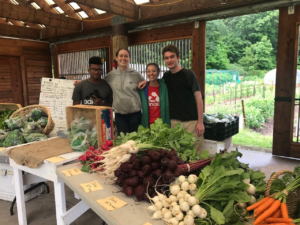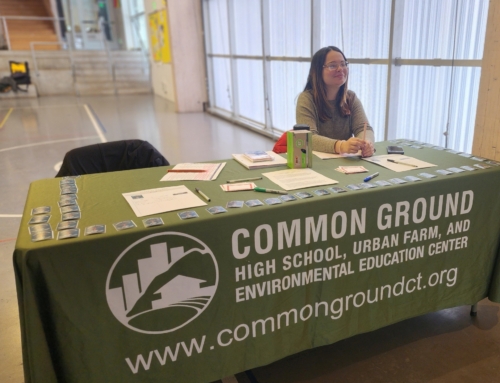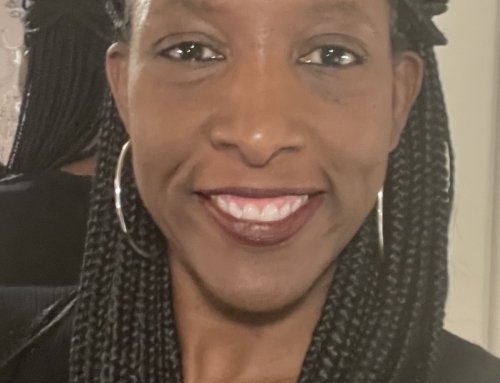By Marisa Vargas-Morawetz
Yale Presidential Public Service Fellow
Yale undergraduate Marisa Vargas-Morawetz spent last summer at Common Ground through a Presidential Public Service Fellowship. She worked on our farm, often alongside the members of our Green Jobs Corps farm crew. She also reached out to a number of Green Jobs Corps alumni, asking them about the long-term impact of being involved in this program. She intentionally sought out students who had chosen different paths after high school: straight to work, to two-year colleges and four-year universities, trying college and then moving into the workforce, even students who had continued to work at Common Ground after graduation. Below, Marisa shares some of what she heard from these program alumni.

Marisa, second from left, with members of Common Ground’s farm staff and summer Green Jobs Corps crew.
From my conversations with alumni of Green Jobs Corps, I got to see how the program both provides a fun and useful activity for Common Ground students and sets them up for future success. The alums that I spoke to all described their Green Jobs Corps experiences overwhelmingly positively, either because the skills they acquired were useful for them later in life, or just because they enjoyed the experience itself. For most of the interviewees, their job placements through Green Jobs Corps were a crucial part of their overall Common Ground experience. Both for the interviewees who went straight into jobs and for those who are in college, having work experience on their resumes has been incredibly helpful in post-graduation job searches.
Many of the alums emphasized that their overall experience in Green Jobs Corps taught them how to navigate a workplace environment successfully, which proved helpful to them as they entered jobs after graduating from Common Ground. For some of the interviewees, workshops helped them develop these workplace skills, but most interviewees pointed to strict attendance and timeliness policies as helpful (if initially annoying) policies that taught what was expected of them in a workplace environment. Ke’John Ervin — who continued to work in Common Ground’s children’s programs after graduating high school in 2011, while also starting his own business and working in other schools — said that he initially struggled with these policies, and that his GJC experience taught him about “accountability and timeliness” because “Shannon (Common Ground’s Farm Manager) was not having it if we were late.” Jesus Reyes, a 2015 graduate and student at University of Maine, said that his experience in GJC helped him develop effective communication skills, because he found that good communication was necessary in order to navigate his relationship with a supervisor:
“The entire experience really does just prepare you in terms of being able to speak to people, being able to be clear, being able to understand people, just listen to them and try to get where they’re coming from. That would count as a personal and a professional skill, because you want to listen to your boss, you want to try to understand them, because you don’t want to hate your boss, but at the same time it does come from an aspect where you have to be professional, to work with them on any level, to make sure that stuff gets done.” Read more from Jesus Reyes.
In addition to job experience, Green Jobs Corps provided many of the interviewees with tangible tools to use in future job searches. For example, Carlos Granda, Common Ground ‘14, described going back into his Common Ground email account to find the resume he had made in a GJC workshop (which, at the time, he thought was not especially useful), and he was able to use that resume to get a job. Carlos also especially remembered having a professional come in to do mock interviews with GJC participants, and said that that workshop effectively taught professional skills. Sam Torres, who graduated in 2013, also continues to use the resume that she initially developed in Green Jobs Corps, and uses the advice she learned in the workshop to continue updating it.
Beyond the practical experience and tools that GJC offers, some of the alums also emphasized that GJC provided opportunities for personal growth and development of leadership and communication skills. Elmer Gálvez — currently a student at Gateway Community College — appreciated that he was often required to step up as a leader in his GJC positions, in moments when his supervisors were not around, and GJC thus helped him become comfortable in a leadership role. Carlos and Sam both positively described being placed on work teams with people they did not know well — Carlos with a Sound School student at URI, and Sam with other students in her LEAF internship — as it gave them the opportunity to get to know new people through doing hard, fulfilling work. As Carlos described his URI experience,
“you’re helping the community, you’re coming together with people you don’t know, because they’re pairing you up with another student from the Sound School and they just throw you on a team and they’re like ‘listen, you’re going to wake up at 9am, you’re going to be here, you’re going to be ready, you’re going to plant a tree’ and just those little things makes the community stronger and makes them come together and do some work together.” Read more from Carlos Granda.
In our conversations, program alumni also talked about how the fact that GJC is a paid experience made it especially helpful for these alums. The motivation of a paycheck helped with learning workplace skills, and the interviewees appreciated having the opportunity to earn money while still in high school. For Sam, earning money and being able to purchase her own school supplies and clothing gave her a feeling of independence and preparedness for ‘the real world.’ Jesus appreciated having “money to put food on the table, and money to line my pocket for anything.” For Elmer, “actually having” the money was helpful, “but also managing it.”
“When I got my first paycheck, I was ecstatic about having it and actually earning. But, you know, I started to realize that it was so finite and that I had to go through managerial processes and had to actually manage it.” Read more from Elmer Galvez.
Many of the interviewees were also thankful for the clear communication they received from supervisors and GJC coordinators. As Carlos put it, “it was very organized, very straightforward, there was no hidden things once you get to the job that were different from what (program manager) Mr. G described to you.” Sam especially appreciated the fun and caring environment fostered by her supervisors. As she puts it,
“they were so caring, they made sure that we were always hydrated. We also had a lot of fun. The people were so cool and they didn’t always take things seriously… I remember I was always laughing and having good times with the people I worked with or with the adults that were teaching us these things.” Read more from Sam Torres.
The alums that I interviewed really appreciated gaining environmental knowledge even if they did not choose to pursue an environmental career, and they found that the jobs they participated in through GJC helped them apply environmental concepts that they were learning in Common Ground classrooms. Sam is not pursuing an environmental career, but she continues to use her environmental knowledge in her non-professional life, and she hopes to one day live somewhere where she can come into more contact with nature on a daily basis. Carlos connects his work as an electrical salesman to the things he learned at Common Ground by encouraging customers to purchase environmentally-friendly electric supplies. For Jesus, who is working with the US Fish and Wildlife Service while attending college, GJC provided him with the opportunity to learn about hands-on applications of environmental knowledge, in a way that was not available to him in a traditional classroom setting.
Curious to learn more about how Green Jobs Corps prepares our current students for success? Read a post by Tom Gaudioso, who manages the program.






Leave A Comment